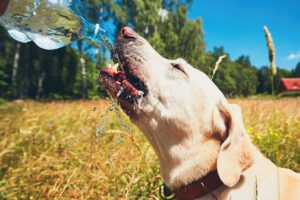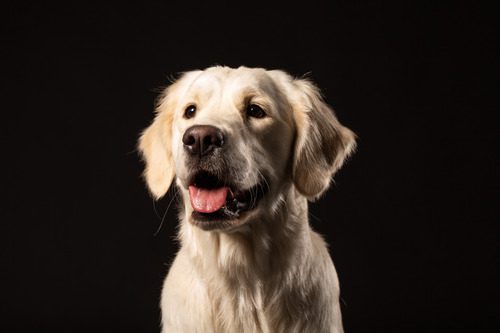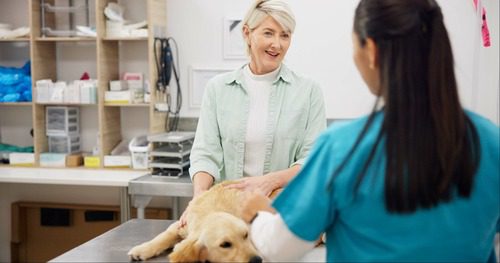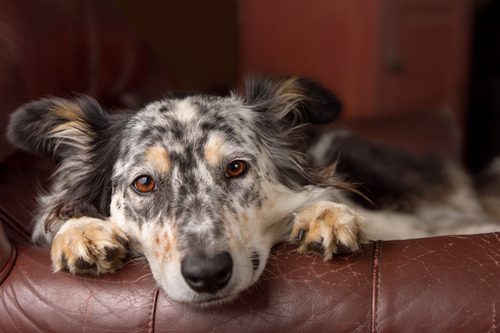Signs of Dog Dehydration
Dehydration is a common condition and possibly life-threatening condition in dogs that occurs when they lose more fluid than they consume. The body needs water to operate properly and to stay healthy and active. The body of a dog typically gains and loses water throughout the course of the day. Water loss is caused by breathing, urinating, and defecating. This can happen for a variety of reasons, including illness, hot weather, and exercise. It’s critical to identify the symptoms of dog dehydration and take measures to both treat and prevent it. Here are a few symptoms of dog dehydration.
Signs of moderate dehydration
The following are signs of moderate dehydration in dogs.
Loss of Skin Elasticity
A skin elasticity test is one of the simplest methods to detect dehydration in dogs. Pull the skin on your dog’s neck or shoulder up gradually, then release it. Your dog is hydrated if the skin quickly resumes its usual position. Your dog might be dehydrated if it takes a few seconds for the skin to return to its usual position. It’s best to check your dog’s epidermis first to ensure that it’s properly hydrated. Since some breeds, such as the bulldog or Neapolitan mastiff, have less elastic skin even under normal circumstances, it is particularly crucial for the owners to have a general idea of their dog’s condition.
Dry Mouth and Gums
Dry mouth and gums are also common signs of dehydration in dogs. Dogs who are dehydrated may have reduced thirst drives, which makes it challenging for them to consume enough water to stay hydrated. This can make it uncomfortable for them to consume or drink because their mouth and gums will become dry and sticky. Check your dog’s gums to see if they are sticky or dry, and perform a CRT test (capillary refill time). For two seconds, apply light pressure with your finger against your dog’s gums. If the area where you pressed turned white for a few seconds before returning to its usual pink color, your dog is well hydrated; however, a dehydrated dog takes much longer.
Sunken Eyes
Dehydration can also cause your dog’s eyes to appear sunken or hollow. This occurs as a result of fluid loss and thinning of the membranes surrounding the eyes. Additionally, your dog might feel weak and lethargic and be less inclined to play or move around than normal. In severe cases of dehydration, your dog may even experience shock, seizures, or collapse.
Excessive Drooling
Dogs who are dehydrated drool more than usual, and they will attempt to cool off by drinking more water.
Dry Nose
A dry nose is a symptom of early dehydration, though it can also indicate other health issues, such as a fever. To avoid other dehydration symptoms getting worse, water must be provided to dogs with dry noses as soon as possible.
Thick saliva
This clear sign of dehydration can range in severity from mild to extreme. At this time, closely monitor the dog and provide lots of fluids.
Weakness and Lethargy
Dehydration can make the dog appear weak, weary, and lethargic. Most often, mild dehydration causes a lethargic state. It’s possible that your dog won’t be as active or playful as normal.
Dark urine
Dark urine is another indicator of dehydration. Dogs’ kidneys preserve water when they are dehydrated by producing less urine. This causes the pee to become dark and concentrated. Your dog may be dehydrated if you observe that his or her urine is dark or discolored.

Signs of severe dehydration
The following are signs of severe dog dehydration.
Vomiting
When a dehydrated dog starts vomiting, the situation may worsen, leading to the dog becoming even more dehydrated. Don’t hesitate to bring your dog to the emergency animal clinic right away.
Diarrhea
Similar to vomiting, it can make your dog’s health worse as they are losing more fluid than they are gaining. Take the dog to the veterinarian right away for treatment.
How long does dehydration last in dogs?
A pet can typically go for three days without consuming water. However, after 24 hours, the symptoms of dehydration start to show.
Treatment options for dog dehydration
If you suspect that your dog is dehydrated, it’s important to take steps to treat and prevent further dehydration. Make sure your dog has access to a lot of fresh, clean water, and urge them to drink frequently throughout the day. A small amount of low-sodium chicken or beef broth can be added to water to make it more palatable for dogs who are reluctant to consume it. Don’t let your dog consume a lot of water at once, as this could cause them to vomit, which will make them further dehydrated.
If your dog is severely dehydrated, veterinary treatment may be necessary. The vet will perform a “head-to-toe examination” to determine the degree of dehydration and will administer IV fluids in accordance with the severity. Your veterinarian can administer fluids to your dog intravenously or subcutaneously to rehydrate them promptly. They can also identify the underlying factors that led to your dog’s dehydration and address any underlying issues.
Prevention of Dog Dehydration
- Always make sure there is the availability of fresh, clean water. Dogs can be trained to consume water at a certain time, developing a habit.
- Avoid providing your dog with salty snacks because they might make them thirstier.
- If your canine exhibits vomiting or diarrhea, you should be aware of the symptoms of dehydration and consult your veterinarian.
Conclusion
Dehydration in canines can be prevented and treated by recognizing the symptoms early on. You can support your dog’s health and hydration by providing them with a lot of fresh water to consume and keeping an eye on their behavior and well-being. If you suspect that your dog is dehydrated, contact your veterinarian for advice and treatment options. If untreated, dog dehydration can be serious. It’s significant to identify the symptoms of dehydration, which include dark urine, lethargy, weakness, and loss of skin elasticity. If you think your dog is dehydrated, take action to treat and stop further dehydration. For example, give your dog access to fresh water and, if required, seek veterinary treatment.
If you are looking for treatment for dog dehydration in Las Vegas, NV, contact Sahara Pines Animal Hospital. Our vets can help bring your dog back from a state of dehydration and make sure they are feeling okay again. Give us a call today at 702-876-7580, or request an appointment online.
Recent Posts
About Sahara Pines Animal Hospital
For exceptional veterinary care in an environment that welcomes you as family, partner with Sahara Pines Animal Hospital and we’ll help you meet all your pet’s needs for a lifetime.




